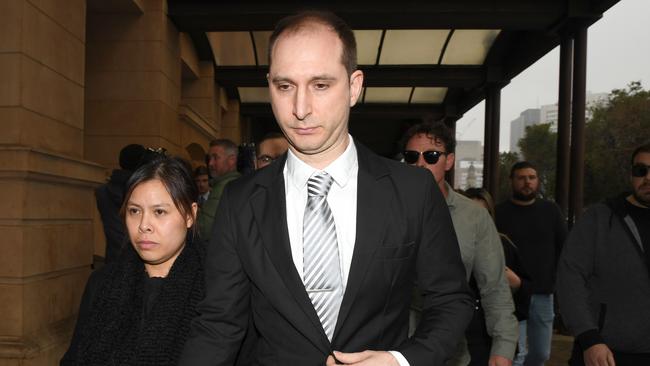Judges can only play the hand that they have been dealt | David Penberthy
Last Friday’s radio show was a busy one for the dump button, writes David Penberthy.
Opinion
Don't miss out on the headlines from Opinion. Followed categories will be added to My News.
While the Lamborghini case involving the appalling death of young Sophia Naismith was still under way, there was another judgment involving a terrible accident that received less attention.
The case involved a good man who had devoted his life to public service and who had made what a Magistrate fairly described as a genuine and tragic mistake. The mistake happened when he was trying to help a man who he ended up seriously injuring after he lost control of his own car.
When you compare and contrast the two cases, that of Lamborghini driver Alexander Campbell and former judge and coroner Wayne Chivell, you can see how the workings of the criminal law can leave people scratching their heads.
As things stand, it is possible that when he is sentenced, the reviled Lamborghini driver could receive a lesser penalty than that imposed on Mr Chivell, who pleaded guilty to an aggravated count of careless driving and had his licence suspended for nine months.
Campbell in contrast was found not guilty of causing death and serious harm by dangerous driving, but has pleaded guilty to the lesser charge of aggravated driving without due care, a crime for which he will lose his licence for as little as six months.

There have been a lot of fiery comments about the conduct of the judiciary in the Alexander Campbell case. I have heard people say that the Judge “got it wrong”, and worse. Last Friday’s radio show was a busy one for the dump button, as so many of the calls simply could not have been aired without setting some sort of record for contempt of court.
I am as appalled as anyone by the result of the Lamborghini case. But we should recognise that judges can only play the hand that they have been dealt by the statutes, that they are bound by the weight of precedent, and must also abide by the legal principle that an accused person must be found guilty beyond reasonable doubt of committing a criminal act. In covering another story I was talking this week to a former Supreme Court judge, and by way of small talk asked if he missed his old job.
He said the one thing he most certainly did not miss was sentencing, as he felt the weight of social responsibility coming down upon him as he worked through the facts at hand.
District Court Judge Paul Muscat alluded to this pressure in his remarks in the Lamborghini case, where he said he had spent four weeks grappling with it. The Director of Public Prosecutions may yet appeal, and argue there were areas where the Judge should have been more accepting of evidence led by the prosecution. But there seems little point in bagging Judge Muscat, or asking baseless questions about his sincerity and application, as if we do we are missing some broader issues.
I would argue that unlike the case of Wayne Chivell, whose entire life was blemish-free, there were signs before the Glengowrie crash that Alexander Campbell was someone who should not have been behind the wheel of a car that does 320km/h and can reach 100km/h in 2.9 to 3.5 seconds.
Or at the very least, his apparent “right” to be behind the wheel of such a powerful car should have been tested and interrupted by tougher laws. Much has been made of his personalised number plate, PSYKO, which does not suggest the quiet demeanour of someone who’s only interested in getting from A to B in a safe and sensible fashion.
Such an observation is not even close to being admissible in court. It proves him guilty of nothing other than being a jerk.
Of more interest is the fact that, when Campbell tastelessly and successfully asked for his licence back so he could drive his pregnant wife while awaiting trial, it emerged that he had not one, not two, but 18 previous traffic expiations and had also been caught street racing. A pattern is beginning to emerge here, surely?
Yet there he was, driving around Glengowrie with his traction control switched off, a setting which prevents cars from sliding or doing any of those other manoeuvres which some men regard as the ultimate display of bravado.
Rather than potting the Judge at the end point of this miserable ordeal, we need to consider a root-and-branch reworking of the traffic laws – and crucially penalties – so we have a calibrated system where recidivist traffic offenders are treated like the menaces they truly are. I marvel every morning at 6.45 when we talk to SAPOL about how many other law-breaking motorists are driving disqualified or without licences.

There was one bloke caught the other morning who hadn’t had a licence for 10 years. None of these crimes are treated seriously enough.
And then there’s the question of street racing. First offence you should lose your licence for a very long time. You should also lose your car too. There can be no explanation for ever doing it. The law should reflect that.
For too long in this state our governments have sounded less like the voice of the people than an informal meeting of the Law Society when presented with cases that offend public standards. To that end the Malinauskas government, which is happily light on for lawyers, deserves credit for immediately talking to the family of Sophia Naismith and announcing plans to implement change.
Whatever respect I showed above to the courts is tempered by the conviction that the people – and through them the parliament – have every right to question the workings of the law and demand better. The law did not spring from nowhere. It is also constantly evolving.
It needs to evolve here, as there are too many drongos out there who regard the motor vehicle as an extension of their masculinity, and even have a pathetic number plate to prove it.





